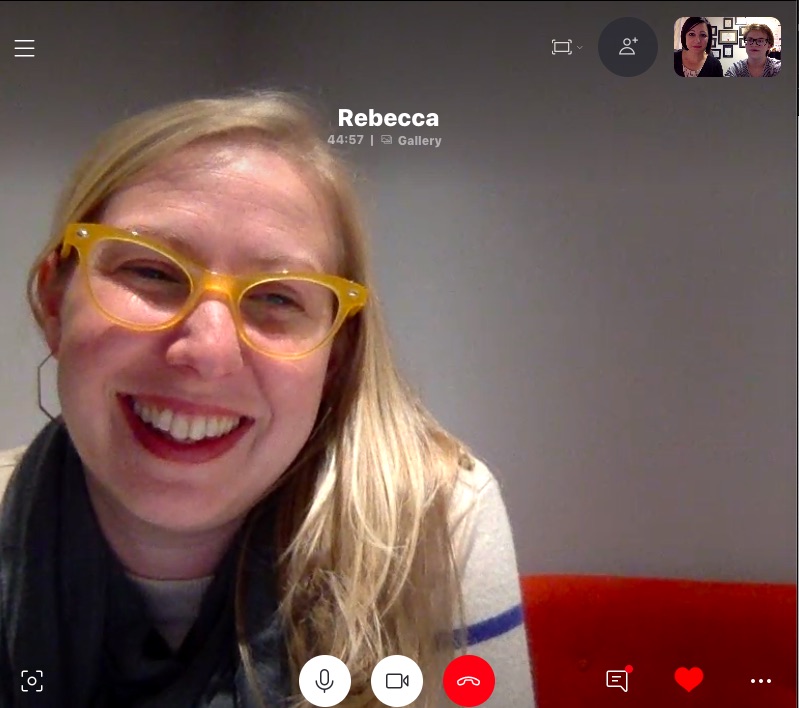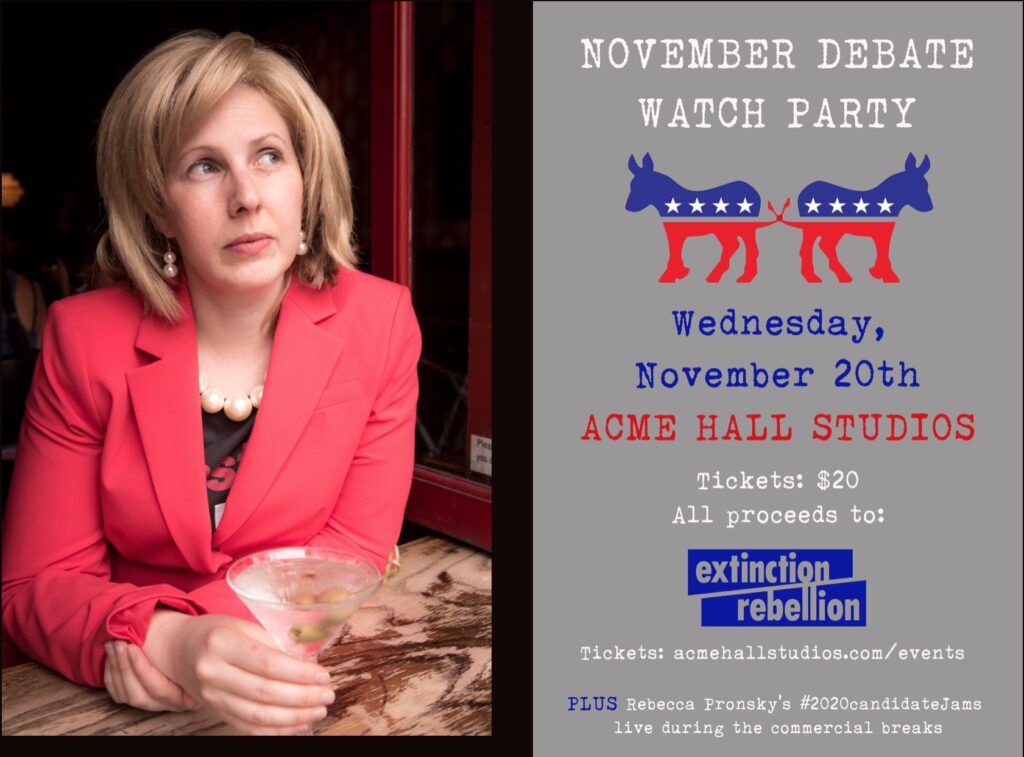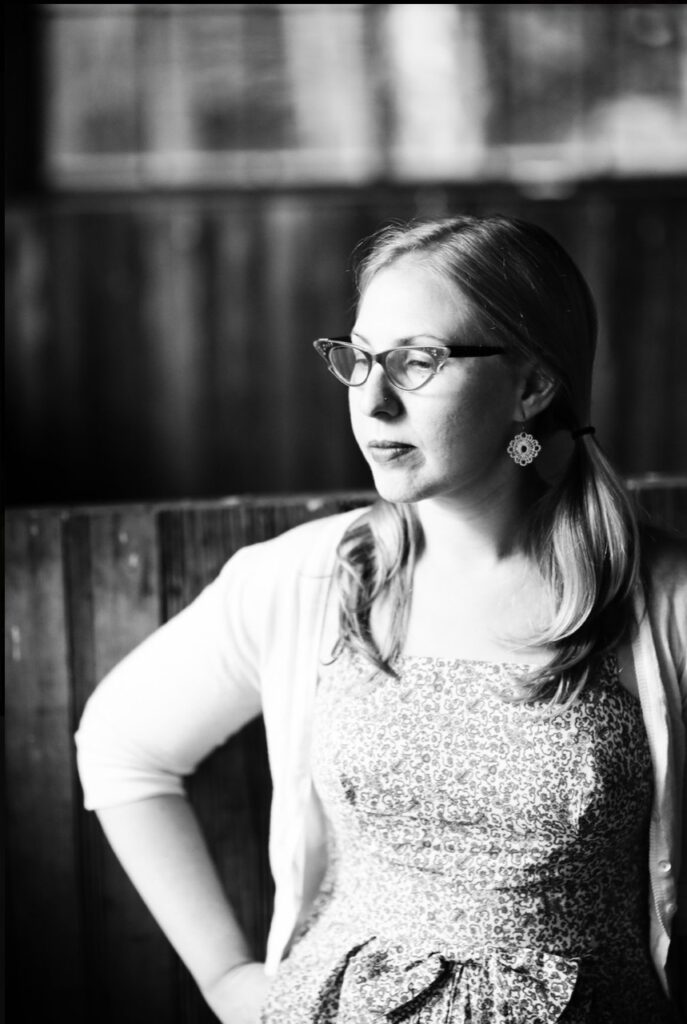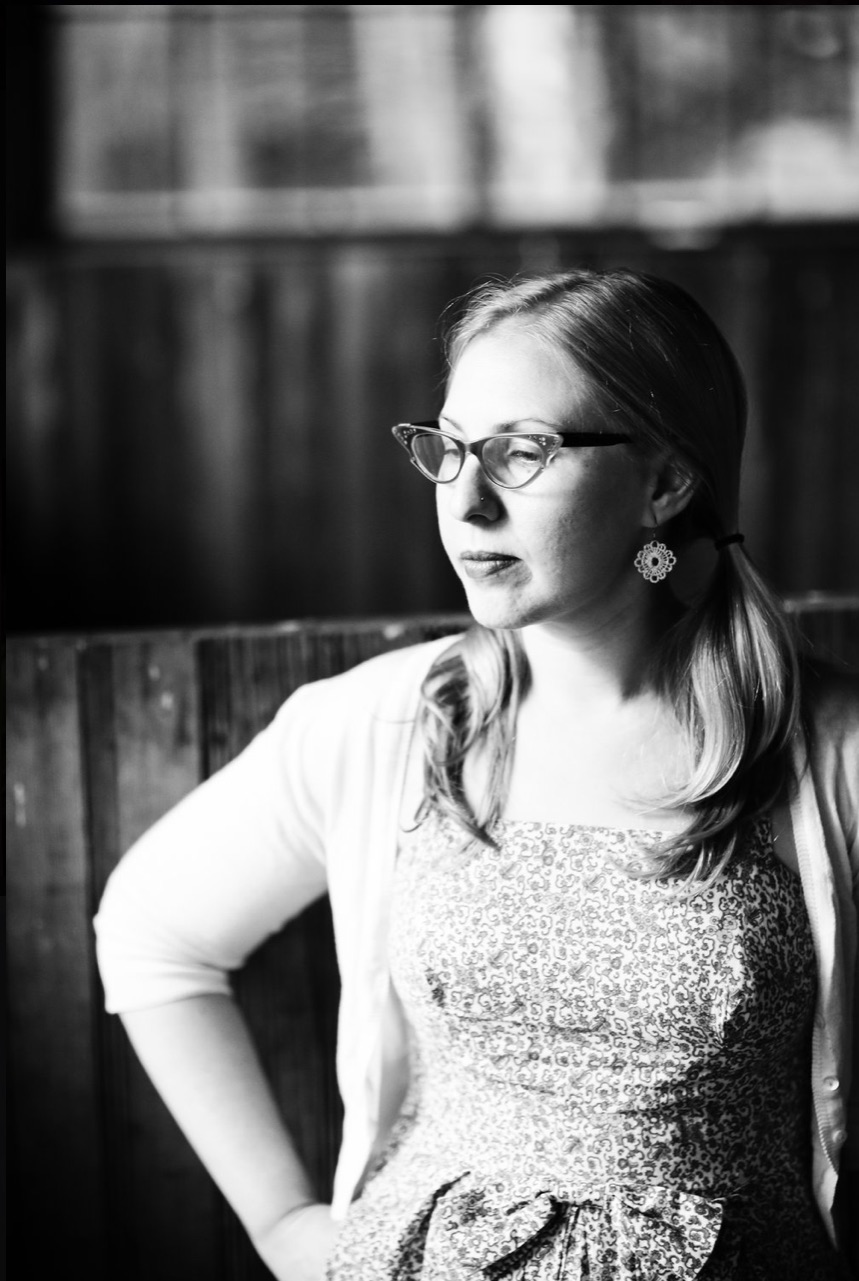On October 28, 2019 Trax research assistant Sarah Griffin and Trax founder Dana Gorzelany-Mostak had the pleasure of speaking to Rebecca Pronsky, a singer-songwriter based in Brooklyn. Pronsky first came to our attention when we heard her delightful 2020 Candidate Jams, 60-second didactic songs dedicated to each Democratic presidential candidate. What made this country-noir artist turn to the campaign for source material? Read on to find out.

Sarah Griffin: Can you tell us a little bit about yourself?
Rebecca Pronsky: Sure. I’m a singer-songwriter born and raised in Brooklyn and after the 2016 election, my music pivoted from introspective folk songs written mostly on guitar to political commentary and comedy written mostly on piano.
SG: Speaking of your political music, as I was going through mainly YouTube, your Candidate Jams kept coming up.
RP: That’s awesome!
SG: Yeah! I wanted to ask what inspired you to compose 60-second songs for just voice and piano?
RP: At the time it struck me as absurd just how many people were throwing their name in the hat to run for the nomination. It was like a clown car, one after the other. They just kept coming. Since the situation was comical in its own right, it was easy to expand upon the comedy that was already there. I also thought it’d be fun to learn more about the candidates myself and make the project somewhat educational for listeners. I’m pretty involved in politics and before I wrote the songs, even I didn’t know who half of these people were. Most of the folks I know didn’t either. I wrote about half of them on piano and the other half on drums, guitar, ukulele, bass and auto-harp. I had to change it up for the sake of variety.
SG: Was there a purpose behind the 60-second limit per video or was that just a part of the fun aspect of it?
RP: Instagram has a 60-second video limit and I thought this would be a great limitation to work with. I used the Instagram rule to help me create a structure for the project. I think limits can be really useful in sparking creativity. The time limit helped me to think of the songs more as jingles. The Kirsten Gillibrand song has some information about her, but the memorable part is just the part where I sing her name “Kirsten Gillibrand.” That melody is very catchy. It sounds like a jingle. After she dropped out of the race, people I know came up to me and things like “ It’s too bad about (singing) Kirsten Gillibrand.” I feel like 60 seconds is a good amount of time to cover one or two aspects of a candidate’s story. And honestly, for some of these people, even 60 seconds seemed like maybe too much time.
SG: Did you face any sort of challenges composing political music, and that also applies to your Witness: Hillary’s Song Cycle?
RP: To be fair, I live in a liberal bubble, so I don’t really face that many challenges as far as confrontation or political disagreements. Everyone I know is on the same page about most things, so I didn’t feel like people were gonna hate on what I did or fight with me about it, at least not in person or at a live performance. I will say, though, that on the internet, there have definitely been some surprising reactions. After I wrote a few of the songs, I began putting them up on YouTube. I did this mainly so they could be seen by friends who weren’t on Instagram. I didn’t actually expect anyone else to watch them; I couldn’t imagine how they’d be found. But two of my videos have been seen a lot: the Andrew Yang song and the Tulsi Gabbard song. The Andrew Yang song got a lot of views, and it ended up on a #YangGang Reddit page. Someone who saw it assumed I was a supporter, and tweeted at me asking me if would record ‘Let It Be’ and just change “Mother Mary” into “Andrew Yang?” which I thought was a very strange request. None of these songs were intended to impugn or support any candidates, so I was surprised that people sometimes took them that way. The Andrew Yang song is only about how he used to be goth in high school and does not contain any opinion about his potential fitness to be president! The song I wrote about Tusli Gabbard definitely wasn’t very flattering, but it was just a list of facts about her, about how she used to support a lot of the anti-gay agenda and came late to abortion rights. I got trolled so hard for it! People commented one after another with things like “You suck” or “How dare you smear a veteran?” and “Don’t quit your day job.” Just a lot of really mean, really angry things. A lot of the commenters didn’t have a photo for their profile and were just generic gray silhouettes of a head, which leads me to I think that a lot of them are Russian bots. There was some terrible spelling and a lot of capital letters and stuff like that. All of that was very unexpected.
The other interesting situation I fell into was that a conservative YouTube personality asked permission to use my songs in his videos. Like I said, I had not expected the videos to actually be seen by almost anyone. At the time I got the request, I had just started writing the songs. I put the first five or six of them up on YouTube and the next day, this person with 300,000 followers asked me if he could use them. He tried to sell me on letting him use them by saying that he is only trying to get at the truth about who these candidates are. I didn’t want rule it out, so I watched some stuff on his channel, and I was like, “Ugh, this makes me so uncomfortable.” He makes these political commentary videos that are supposed be funny and “own the libs,” but they’re snarky and insensitive. I disagree with all the politics in it of course, but he was very respectful when he asked me about the songs. It was not my intention for the project to really support either side of the political conversation, but when you do political music, I guess it’s inevitable. I became afraid my sarcasm and humor could be misconstrued, so I said no to the request. The experience was definitely unexpected and made me think for a minute, “Why am I even doing this? Is this a good idea? Where is this going?”, but I really wanted to finish the project, so I kept going.
SG: Was there a similar reaction to Witness: Hillary’s Song Cycle or was that only with the candidate jams?
RP: Nobody really saw the Witness stuff on YouTube. I think maybe it doesn’t fit the YouTube algorithm. That project also wasn’t meant so much for the internet. It started as a recording project and morphed into a live theatre piece.
SG: How did audiences, whether it was online or in person audiences, react to it?
RP: I had already had a career of being a singer-songwriter for fifteen years before doing Witness. My music hadn’t been particularly political, so when I announced to my mailing list that was going to be doing a concept album about Hillary Clinton and the 2016 election, some folks decided to jump ship. One fan unsubscribed and then wrote me saying “Hillary is killing America.” She was offended that I’d write about someone so terrible. With Witness I wasn’t even trying to say Hillary is a blameless, perfect person. It was more a way for me to process and express the sadness and rage and distress of the loss for women. No one was experiencing the loss more directly than Hillary herself so having her be the mouthpiece for the project made sense. A lot of people told me, “If you’re losing people from your mailing list, that means you’ve hit a nerve and that means you’re doing something right.” It’s an interesting way of looking at it. The project was super fun. I worked with only women, from the recording with an all-female band, engineer, and the female designer of the album art, to the live show with a female director and female co-star. It was really healing for the all-women band to work together in the studio just months after the election. Then the songs turned into a show, and the show was very cathartic for people to watch. A lot of people I know came and cried. I wasn’t really concerned about people who disagreed with me coming to the show, because unless you’re an extremely confrontational person, I don’t think you would spend money to go to a show called Hillary Clinton’s Song Cycle!
SG: Going off of that, what was your thought process when you were composing Hillary’s Song Cycle: Witness, and how did it help you to cope with the 2016 election?
RP: After the election, I ran a bunch of charity concerts out of my music studio. The first one was called “Songs of Resistance,” and all the musicians who participated had to write and perform songs on the theme of resistance. I wrote the first two Witness songs for that show, and I don’t think it was until after I wrote them that I realized I was writing in someone else’s voice. Then I was like, “Oh, I’m writing in Hillary Clinton’s voice?! That’s weird!” So that’s where it started. Before those first two songs, I hadn’t been able to write at all for a while, and I just felt too depressed and also very disconnected from what I had been doing before. All of a sudden, I had something to say. I have a duo folk songwriter project with my husband [that] I’ve been doing for fifteen years and did not expect to end up in an all-female band doing a Fringe Festival musical about Hillary Clinton.

Rebecca Pronsky in Hillary Clinton’s Song Cycle: Witness
SG: When you began composing music that had more political subject matter, did you ever anticipate that it would resonate with people the way that it has?
RP: No, I don’t think so. I hoped it would resonate, but that kind of happened as Witness developed. In the beginning it was just a few songs my audience liked. Then it became an all-female recording project and all the women in the project felt really connected to the songs. We did the CD release show on the one-year anniversary of the election and we interspersed quotes from Hillary Clinton into the show, spoken by members of the band. People were crying in the audience and I realized how different this was from what I had been doing before. Then Witness became a theater show and it went to two Fringe Festivals. The songs got paired down from a full band and developed into a two-woman show with my friend Deidre Rodman Struck. The show was directed by my friend Irene Carroll, who is an improv comedian, and she helped me get into character and added an interactive element to make the show more theatrical. The show started with me running on stage to “Ladies and gentlemen… Hillary Clinton!” I wasn’t really sure what to expect from the project, but the more it became developed, the more it resonated with people, and the more people were crying, but also laughing and feeling relieved. I had so many great women work with me and the audiences were really moved. The project sort of took on its own life and its own energy that I don’t feel entirely responsible for.
Dana Gorzelany-Mostak: A question for you: I’m assuming after these performances people probably came up and talked to you. Was there any conversation that you particularly remember when fans engaged with you after [the show]? What they said the impact of the work was on them.
RP: A lot of folks told me that they felt like the show helped them to go back and reexperience the emotions of the 2016 election in a safe space. I think people were grateful that they could have an experience surrounding Hillary Clinton that felt fulfilling and hopeful and connected, as opposed to depressed. That is really what I kept hearing from people. People would tell me about how they campaigned for her or they would share where they were on election night, what it was like for them. Not everyone who saw the show had been a big fan of Hillary. Some supported Bernie first, but everyone was devastated by the loss. It’s something we all remember. It’s one of those national events like the Kennedy assassination—everyone will remember where they were when it happened.
SG: Based on your experiences, would you say that music has unified people or do you feel like in some ways it can push people apart?
RP: Wait, you mean my music or just music in general?
SG: Music in general when it addresses political subject matter.
RP: Well, I’m still new to political music, and topical music in general. In my limited personal experience and observations of the culture at large, I think that music can unify people who are already in the same camp, strengthen their bonds, and create a general sense of goodwill and kindness. Music can give people energy and fuel to fight the fight, but I don’t think people on different teams are going to suddenly feel unified over music. We are in such a broken time. Even the National Anthem is divisive now. An American flag can feel threatening. And to do a project about Hillary Clinton—that’s not going to convince any new folks to like her, but it does bring together folks who felt traumatized by her loss. I gotta say, I’m still amazed by how much people hate Hillary Clinton. I mean, people really hate her, almost inexplicably so. So, my project has limited capacity to unify. It is definitely not going to make any new Hillary fans.
SG: As we approach upcoming elections, how do you see your compositional style or music subjects changing?
RP: I’d really been struggling to come up with a new project because the news happens so fast. Also, it’s hard to know how to make comedy when regular news headlines are essentially Onion headlines. But I have something in mind that I’m cooking up. It’s for even shorter than 60-second attention spans!
DGM: We need a jingle for our website!
RP: Do you really?
DGM: Kinda.
RP: That’s an idea, though. (Gorzelany-Mostak starts pumping her fist.)
SG: What would you say has been the most exciting or enjoyable aspect of composing political music or just music in general?
RP: Before these political musical projects, I’d never written topical music. I wrote introspective, folky, country-noir songs and that’s still the kind of thing I like to listen to. I always thought topical music was a little hokey. But life is so influenced by politics now. I can’t not think about it all the time, so it seems like anything introspective is going to include current events and politics. I might as well just lean in all the way. People really relate to topical music in a way that I didn’t understand before. Audiences kind of already “get it” before it starts, because I’m talking about something they know about. I think that can be comforting for everyone when an audience is collectively familiar with a topic. When you respond to recent or current events, there’s just a different kind of energy that you give, and a different kind of energy that you get back. That sounds kind of dorky.
DGM: Not at all.
RP: (jokingly) There’s an “energy.”
DGM: When you’re out there on the stage performing, do you consider yourself to be an artist or an activist or some sort of combination of both?
RP: So wait, when I’m performing?
DGM: When you’re performing, yes.
RP: Great question. When I started writing political music, I was already engaged in activism, but I did not consider myself to be an activist. My job was artist, but that has really changed as I’ve been doing this stuff. Since 2016, I’ve done most of my shows as fundraisers for various candidates and action groups, and have become involved in campaigns and so on. People ask me all the time “Who should I vote for?” or “What’s on the ballot?” I’m still a musician but my performances are always a way to get people to learn about new causes or candidates. I feel like you just asked me the question that I should have been asking myself lately, but I didn’t think of. For my next project, which is it? Am I going to, like, be an artist again? Or is it going to be more about activism and I’m gonna have to put that to music? That is a really important question.
DGM: Is there anything else that you want to share with us or anything else that you would like us to know? Because we’re happy to hear you talk!
RP: I don’t know if I explained why I wrote the Hillary project or if that’s important.
DGM: Yeah, we’d love to hear more, yeah go for it.
RP: I was so devastated after the election. I didn’t know what my function as a musician would be going forward. I was upset by the results, naturally, but—and I’m sure this was partly a projection—I was consumed with worry about Hillary Clinton as an individual. I just felt so bad for her and couldn’t imagine how she was getting through personally. I think that’s where the idea came from. I used to only write about my own experience, but I took her voice, because, well, nobody feels it more than her. If anyone’s going to be able to communicate the complexity of how devastated we are right now, it’s her. It’s not me! I’m just some chick in Brooklyn. It’s got to be from the figurehead in order to reach people. After I wrote the songs, her book came out and I read it. What I wrote turned out to be pretty accurate to the experience and emotions she reported in the book. I wasn’t trying to put words in her mouth, though. It was more supposed to be for all of us to express ourselves, and she was just the avenue to do that.
You can learn more about Rebecca Pronsky and her upcoming performances here.


